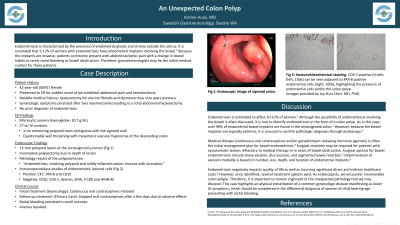Tuesday Poster Session
Category: Colon
P3133 - An Unexpected Colon Polyp
Tuesday, October 24, 2023
10:30 AM - 4:00 PM PT
Location: Exhibit Hall

Has Audio
- KA
Karlee Ausk, MD
Swedish Medical Center
Seattle, Washington
Presenting Author(s)
Karlee Ausk, MD
Swedish Medical Center, Seattle, WA
Introduction: Endometriosis is characterized by the presence of endometrial glands and stroma outside the uterus. In 5-25% of women with endometriosis, the implants could involve the bowel. Because endometrial implants are invasive, patients may present with rectal bleeding, bowel obstruction, or abdominal pain. Therefore, gastroenterologists may be the initial medical contact for these patients.
Case Description/Methods: A 42-year-old (G6P2) lady presented to an outside Emergency room for sudden onset of periumbilical abdominal pain and hematochezia. Her past medical history is notable only for a hysterectomy nine years ago for uterine fibroids and dysmenorrhea. She recalls that her gynecologic symptoms persisted after two myomectomies and ultimately a total abdominal hysterectomy was performed. There was no prior diagnosis of endometriosis. In the ED, she was noted to have microcytic anemia (hemoglobin 10.7 g/dL). Computed tomography (CT) imaging with intravenous contrast was notable for a 1 centimeter enhancing polypoid mass contiguous with the sigmoid wall and questionable wall thickening with mesenteric vascular hyperemia of the descending colon.
She was referred to the endoscopy unit for an outpatient colonoscopy due to the abnormal CT scan. This was notable for a 13-mm polypoid lesion at the rectosigmoid junction. Polypectomy was attempted but was incomplete. After the initial polypectomy, the polypoid lesion appeared to involve deeper sections of the colon wall and the residual tissue could not be grasped. Pathology results of the polypoid lesion were notable for “endometriosis, involving polypoid and mildly inflamed colonic mucosa with ulceration. Immunoperoxidase studies were consistent with endometrial implant.”
The patient was seen by Gynecology where initial treatment with continuous oral contraceptives was initiated and follow-up is pending.
Discussion: Endometriosis is estimated to affect 6-10% of women. Although the possibility of endometriosis involving the bowel is often discussed, it is rare to identify endometriosis in the form of a colon polyp. However, when present, it provides a less invasive method of biopsy and tissue diagnosis compared to laparoscopy.
As gastroenterologists performing endoscopy, we encounter innumerable colon polyps. This case highlights an unusual cause of colon polyp presenting with common lower GI symptoms. Nonetheless, endometriosis causes significant impact on patient quality of life and several treatment options exist once identified.

Disclosures:
Karlee Ausk, MD. P3133 - An Unexpected Colon Polyp, ACG 2023 Annual Scientific Meeting Abstracts. Vancouver, BC, Canada: American College of Gastroenterology.
Swedish Medical Center, Seattle, WA
Introduction: Endometriosis is characterized by the presence of endometrial glands and stroma outside the uterus. In 5-25% of women with endometriosis, the implants could involve the bowel. Because endometrial implants are invasive, patients may present with rectal bleeding, bowel obstruction, or abdominal pain. Therefore, gastroenterologists may be the initial medical contact for these patients.
Case Description/Methods: A 42-year-old (G6P2) lady presented to an outside Emergency room for sudden onset of periumbilical abdominal pain and hematochezia. Her past medical history is notable only for a hysterectomy nine years ago for uterine fibroids and dysmenorrhea. She recalls that her gynecologic symptoms persisted after two myomectomies and ultimately a total abdominal hysterectomy was performed. There was no prior diagnosis of endometriosis. In the ED, she was noted to have microcytic anemia (hemoglobin 10.7 g/dL). Computed tomography (CT) imaging with intravenous contrast was notable for a 1 centimeter enhancing polypoid mass contiguous with the sigmoid wall and questionable wall thickening with mesenteric vascular hyperemia of the descending colon.
She was referred to the endoscopy unit for an outpatient colonoscopy due to the abnormal CT scan. This was notable for a 13-mm polypoid lesion at the rectosigmoid junction. Polypectomy was attempted but was incomplete. After the initial polypectomy, the polypoid lesion appeared to involve deeper sections of the colon wall and the residual tissue could not be grasped. Pathology results of the polypoid lesion were notable for “endometriosis, involving polypoid and mildly inflamed colonic mucosa with ulceration. Immunoperoxidase studies were consistent with endometrial implant.”
The patient was seen by Gynecology where initial treatment with continuous oral contraceptives was initiated and follow-up is pending.
Discussion: Endometriosis is estimated to affect 6-10% of women. Although the possibility of endometriosis involving the bowel is often discussed, it is rare to identify endometriosis in the form of a colon polyp. However, when present, it provides a less invasive method of biopsy and tissue diagnosis compared to laparoscopy.
As gastroenterologists performing endoscopy, we encounter innumerable colon polyps. This case highlights an unusual cause of colon polyp presenting with common lower GI symptoms. Nonetheless, endometriosis causes significant impact on patient quality of life and several treatment options exist once identified.

Figure: Rectosigmoid Colon Polyp
Disclosures:
Karlee Ausk indicated no relevant financial relationships.
Karlee Ausk, MD. P3133 - An Unexpected Colon Polyp, ACG 2023 Annual Scientific Meeting Abstracts. Vancouver, BC, Canada: American College of Gastroenterology.
